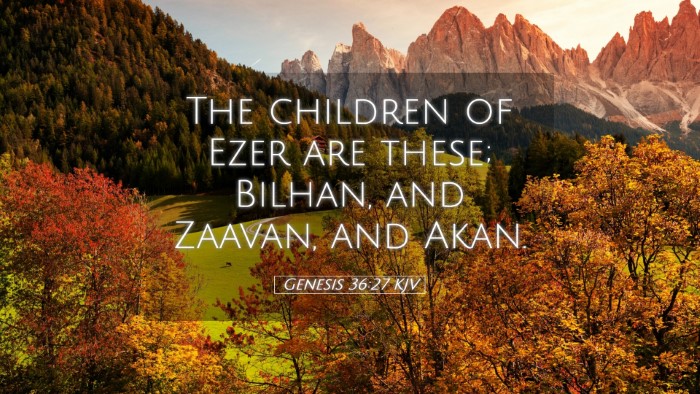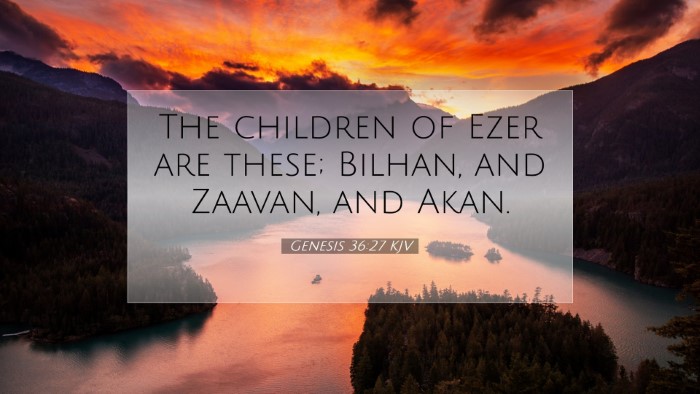Commentary on Genesis 36:27
Genesis 36:27 states: "And the children of Ezer were these; Bilhan, and Zaavan, and Akan." This verse is part of a larger genealogy that details the descendants of Esau, showcasing the family structure and relationships within the Edomite lineage. To fully appreciate the theological and historical implications of this verse, we can draw insights from several esteemed public domain commentaries.
Context and Importance
The significance of genealogies in the Bible cannot be overstated. They serve multiple purposes, including establishing legitimacy, tracing heritage, and fulfilling prophetic messages regarding lineage. In the case of Genesis 36, the focus on Esau's line underscores the importance of recognizing God's covenant not just through Israel, but also through other nations stemming from Abraham.
Matthew Henry's Commentary
According to Matthew Henry, Genesis 36 provides a thorough account of Esau's descendants, which highlights God's providence in the formation of nations. Henry emphasizes that the mention of Ezer's children specifically signifies the establishment of a lineage that would evolve into Edomite tribes. He denotes that these genealogies, while often perceived as tedious, reveal that God is intimately involved in the stories of all peoples, including those who have a complicated relationship with His chosen ones.
Ezer in the Scriptures
Henry points out that Ezer is a notable figure in the Edomite genealogies and suggests that the name itself might mean "helper," which is interesting given the subsequent developments of the clan. The children of Ezer—Bilhan, Zaavan, and Akan—represent both the continuity and diversity within the Edomite context. The inclusion of these names can be seen as celebrating not just the individual family lines, but also the formation of a community tied to Esau.
Albert Barnes' Commentary
Albert Barnes adds depth to the understanding of the descendants mentioned in Genesis 36:27. He notes that these names may have significances tied to personality, occupation, and tribal functions. Barnes explains that Bilhan, Zaavan, and Akan could have had roles that contributed to the socio-political structures within Edom, further enriching the historical tapestry of the region.
The Cultural Relevance
Barnes emphasizes that the study of these names reveals a broader cultural significance, such as the recognition of clan dynamics and their importance in ancient societies. He asserts that understanding the lineage of Esau is crucial for grasping the interconnectedness of biblical narratives and the fulfillment of God’s promises to multiple nations.
Adam Clarke's Commentary
Adam Clarke provides further analysis on the names listed in Genesis 36:27. He delves into etymology and historical context, suggesting that names were often reflective of the character or deeds of individuals in biblical times. Clarke's examination indicates that the characteristics of Bilhan, Zaavan, and Akan may exhibit attributes essential for understanding the identity of the Edomite nation.
Historical Significance
Clarke reflects on the regional influences of the Edomites, including their interactions with the Israelites. He mentions that as descendants of Esau, these tribes were part of a long-standing enmity with Israel, which can be traced back to the familial conflict between Jacob and Esau. This dynamic further enhances the importance of understanding the genealogy not just as a historical record but as a reflection of God’s unfolding plan and human relationships.
Theological Reflections
The genealogy presented in Genesis 36:27 contributes to a broader theological narrative within Scripture. The lineage of Esau represents the complexities of divine election and the diverse expressions of God’s grace. In analyzing this passage with insights from Henry, Barnes, and Clarke, we see reflections of human relationships shaped by conflict, yet also the potential for divine purpose even among those outside the direct covenant.
- Interconnectedness of Families: The mention of Esau’s descendants signifies the interconnectedness of biblical families and nations.
- Diversity in God’s Plan: Each name represents a thread in the larger tapestry of God’s redemptive history.
- Human Relationships: Highlights the complexities of familial relationships influenced by rivalry, choice, and divine design.
Conclusion
Genesis 36:27 serves not merely as a record of names but as a gateway into understanding the intricate narratives woven throughout Scripture. The insights from esteemed commentaries remind us that genealogies are foundational to grasping the theological and historical contexts of the biblical narrative. As pastors, students, theologians, and scholars, the study of such texts invites deeper contemplation on God's involvement in the lives of all people, the unfolding of His promises, and the diverse expressions of faith throughout history.


